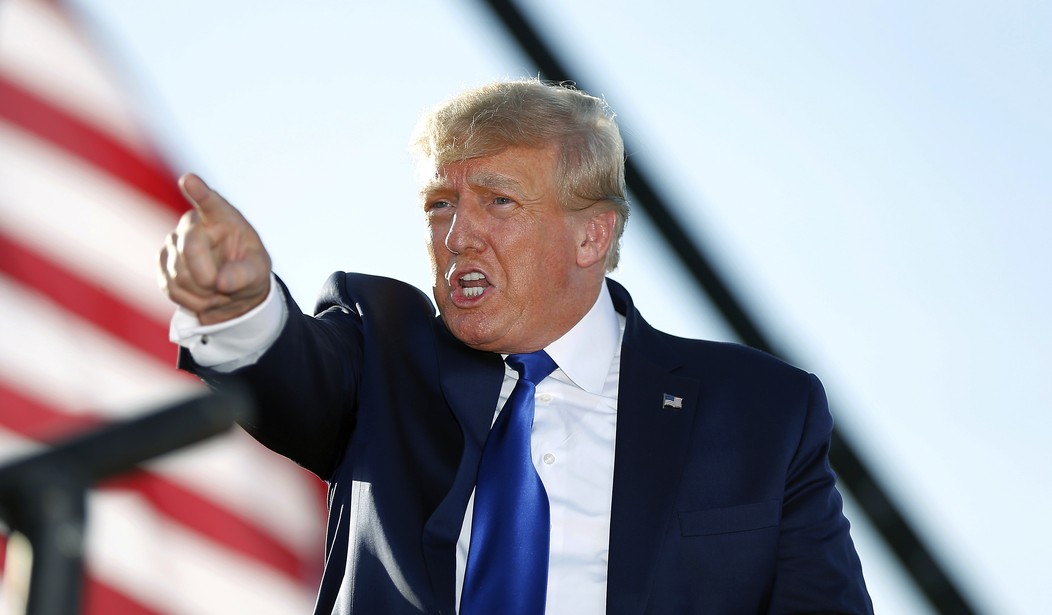President Trump’s administration represents an object lesson in lost opportunities. The ability of the administration to cut the Gordian Knot of the Middle East “peace process” and turn the United States into an energy exporting nation was little short of amazing. That said, the horrible personnel choices made by President Trump and his personal indiscipline combined to create a constant sh**storm that prevented President Trump from ever developing the broad national support he deserved. While the choice of people and intemperate comments would have been background noise, his administration was the subject of a concerted campaign of sabotage and obstruction never before witnessed in our history. The campaign, centered in our “nonpartisan” civil service, robbed President Trump of his first term included a soft coup attempt based on the Russia Hoax and calculated leaks of national security information.
As the preliminary moves in the 2024 election takes shape and a Trump candidacy looks more and more likely, Trump’s team is planning to ensure that a second Trump administration will not suffer the fate of the first. Axios’ Jonathan Swan has looked into what a second Trump administration has in store and wrote about it in A radical plan for Trump’s second term.
First, the bad news.
According to the article, Trump is relying upon the advice of a small group of advisors.
Trump has doubled down with a small group he views as loyal and courageous. The group includes his former senior White House officials, Dan Scavino, Stephen Miller and John McEntee. It also includes his fourth chief of staff, Mark Meadows, though their relationship was strained when Meadows recounted in his memoir private details of Trump’s hospitalization with COVID-19.
Trump trusts only a few of his former Cabinet secretaries and senior government officials, sources close to him said. He still talks casually to many others, and is seldom off his phone, but former aides who felt they could occasionally persuade Trump to change course say he is quick to shut down advice he does not want to hear.
This is pretty much how President Trump operated during his candidacy. Of course, those of us who remember the infighting between Corey Lewandowski and Paul Manafort and you-name-it would rather not go through this again. I wrote about Trump’s inner circle at war during 2016 (see Donald Trump’s Unveils His “Team Of Vicious Gits” and Open Warfare Breaks Out Among Donald Trump’s “Team Of Vicious Gits”) and much of the chaos in the early weeks of the Trump administration was a direct result of the internecine battles that started on the campaign trail.
Now the good news.
MAGA-oriented “non-profits” are building a list of personnel for a Trump II administration and identifying policy roadblocks to remove.
One important hub of 2025 preparations is the Conservative Partnership Institute (CPI), an organization whose nonprofit status under the tax code allows it to conceal its donors’ identities. CPI is a who’s-who of Trump’s former administration and the “America First” movement.
Founded by former firebrand GOP South Carolina Sen. Jim DeMint — the bane of Mitch McConnell’s existence when he served in Congress — CPI has become the hub of the hard right in Washington.
…
Another influential group is Vought’s Center for Renewing America — designed to keep alive and build upon Trump’s “America First” agenda during his exile.
Vought kept a relatively low media profile through much of the Trump administration but by the end Trump trusted him as somebody who would rebuff career officials and find edge-of-the-envelope methods to achieve Trump’s ends.
When Congress blocked Trump from getting the funds he needed to build the southern border wall, Vought and his team at the Office of Management and Budget came up with the idea of redirecting money from the Pentagon budget to build the wall.
In the final week of the Trump administration, Vought met with the former president in the Oval Office and shared with him his plans to start CRA. Trump gave Vought his blessing. CRA’s team now includes Jeffrey Clark and Kash Patel as well as other Trump allies including Mark Paoletta and Ken Cuccinelli, former acting deputy secretary of Homeland Security.
Vought plans to release a series of policy papers, beginning this year, detailing various aspects of their plans to dismantle the “administrative state.”
Vought has other far-reaching intentions. He has told associates it was too onerous in the past for Trump officials to receive security clearances, so he plans to recommend reforms to the security clearance system. He also wants to change the system that determines how government documents become classified.
…
America First Legal was launched by Trump’s influential senior adviser Stephen Miller less than three months after Trump left office. Its primary purpose was to file lawsuits to block President Biden’s policies — mirroring a well-funded legal infrastructure on the left.
But Miller has also been doing another job in preparation for 2025 that has not previously been reported. He has been identifying and assembling a list of lawyers who would be ready to fill the key general counsel jobs across government in a second-term Trump administration.
Trump’s close allies are intently focused on the recruitment of lawyers. Trump frequently complained that he did not have the “right” lawyers in the White House Counsel’s Office.
…
Other senior officials, including Miller, believed the federal agencies were clotted with cowardly general counsels too worried about their Washington reputations to risk throwing their support behind Trump’s policies. Instead, the Trump team suspected, these general counsels allowed the career attorneys to steamroll them.
Miller has his eye out for general counsels who will aggressively implement Trump’s orders and skeptically interrogate any career government attorney who tells them their plans are unlawful or cannot be done.
Potential game-changer.
In the waning days of the Trump administration, President Trump used an executive order to create a new schedule, or class, of civil service employees. The civil service comprises three categories of employees: Senior Executive Service, competitive, and excepted. The Senior Executive Service was intended to be the equivalent of a general officer corps; to say it has not measured up to the dream is an understatement. Competitive means you apply for a job and are hired based on your race, ethnicity, ability to mouth progressive shibboleths, and sexual proclivities; sorry, I mean abilities. Finally, excepted applies to employees where an open competition may not be feasible or appropriate. The excepted category comes in five flavors:
Schedule A. Positions other than those of a confidential or policy-determining character for which it is not practicable to examine shall be listed in Schedule A.
Schedule B. Positions other than those of a confidential or policy-determining character for which it is not practicable to hold a competitive examination shall be listed in Schedule B. Appointments to these positions shall be subject to such noncompetitive examination as may be prescribed by OPM.
Schedule C. Positions of a confidential or policy-determining character shall be listed in Schedule C.
Schedule D. Positions other than those of a confidential or policy-determining character for which the competitive service requirements make impracticable the adequate recruitment of sufficient numbers of students attending qualifying educational institutions or individuals who have recently completed qualifying educational programs shall be listed in Schedule D. These positions are temporarily placed in the excepted service to enable more effective recruitment from all segments of society by using means of recruiting and assessing candidates that diverge from the rules generally applicable to the competitive service.
Schedule E. Positions of administrative law judge appointed under 5 U.S.C. 3105 shall be listed in Schedule E.
This link explains Schedules A through C; Schedule D is the Presidential Management Fellow program. Schedule E are administrative law judges. The excepted schedule that most people are familiar with is Schedule C, also known as political appointees. There are about 4,000 of these across government and about 1,200 require Senate confirmation. The role of Schedule C employees is to carry out the president’s policy objectives.
What President Trump encountered was a Civil Service that was implacably opposed to him and his policies. The handful of Schedule C employees was overwhelmed by the internal opposition in the agencies. On October 26, 2020, President Trump created Schedule F to the excepted category.
- substantive participation in the advocacy for, development, or formulation of policy, especially development or drafting of regulations and guidance
- substantive policy-related work in an agency or component that primarily focuses on policy
- the supervision of attorneys
- substantial discretion to determine the manner in which the agency exercises functions committed to it by law
- working with non-public policy proposals or deliberations generally covered by deliberative process privilege, and either:
- directly reporting to or regularly working with an individual appointed by either the President or an agency head paid at the GS-13 level or higher, or
- working in the executive secretariat of the agency or component
- conducting certain collective bargaining negotiations on the agency’s behalf
This would entail the reclassification of tens of thousands of employees as Schedule F, meaning they would be, for all intents and purposes, “at will” employees. Personally, I think this is a great move. It has no downside whatsoever for Republicans because the worst a Democrat administration can do is fill those positions with people like those who already hold them.
Gutting the Intelligence Community and Department of Justice.
There is no doubt that the Intelligence Community, the Department of Justice, and the FBI declared war on President Trump. There was not only the obscene Russia Hoax but also the joint effort that resulted in President Trump’s first impeachment on the most flimsy and transparently partisan grounds. Likewise, when Hunter Biden’s laptop surfaced during the campaign, the Intelligence Community wasted no time declaring it a Russian fake.

As we and a federal grand jury (see Jonathan Turley and Former U.S. Atty Raise Questions About ‘Critical Stage’ of Hunter Biden Case) now know, the laptop is completely legitimate.
According to Swann, the Trump team has identified high-priority targets for cleansing.
Sources close to the former president said that he will — as a matter of top priority — go after the national security apparatus, “clean house” in the intelligence community and the State Department, target the “woke generals” at the Defense Department, and remove the top layers of the Justice Department and FBI.
Final thoughts.
This plan, aggressively executed, would be the best thing that’s happened to the nation since, at least, the election of Ronald Reagan. It would prevent the fifth column of activist Democrats inside the federal bureaucracy from carrying out the guerilla war against Republican administrations and return a large measure of control of the government to elected representatives. It is clear that the Intelligence Community, the Department of Justice, and the FBI are nothing more than Democrat stormtroopers. If a Republican president can’t bring them to heel, he’s doomed.
I do hope that President Trump looks at Joe Biden and decides not to run. I fear the behaviors that marred his first term are too much of his persona to change. He can do more to help his own movement by passing the torch than by running. If he does run and is elected, he has a plan to do what he was never able to do while in office. If he doesn’t run, he has left his successor a blueprint for action, and we should demand they promise to carry it out.














Join the conversation as a VIP Member